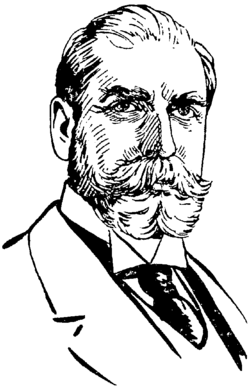Collier's New Encyclopedia (1921)/Hughes, Charles Evans
HUGHES, CHARLES EVANS, an American lawyer and public official; born at Glens Falls, N. Y., Apr. 11, 1862. He was graduated from Brown University in 1881, and from Columbia University in 1884, being admitted to the bar the same year. He practiced in New York City till 1906, while holding the positions of professor of law at Cornell University, in 1891, and professor at the New York Law School in 1893. Hughes was retained as counsel in the Stevens Gas Commission, in the Armstrong Insurance Commission, and was special assistant to the United States Attorney-General in the coal strike investigation in 1906. He was elected by the Republican party as Governor of New York in 1907 and 1909. In 1910 he resigned to accept an appointment from President Taft on the bench of the U. S. Supreme Court.
In 1916 the Republicans nominated Justice Hughes for the presidency and he resigned from the Supreme Court. During the preliminary campaign for the nomination Justice Hughes refused to be a candidate or in any way express a desire to obtain the nomination. Defeated by Mr. Wilson by a very narrow margin in the election of 1916 Mr. Hughes resumed the practice of law in New York City. During the World War he served as chairman of the Draft Appeals Board, New York City, and as special assistant to the U. S. Attorney General in charge of the aircraft inquiry. He was a member and at times an officer of several legal and patriotic societies, a fellow of Brown University, a trustee of the University of Chicago. He became Secretary of State in the Cabinet of President Harding, March 4, 1921.
